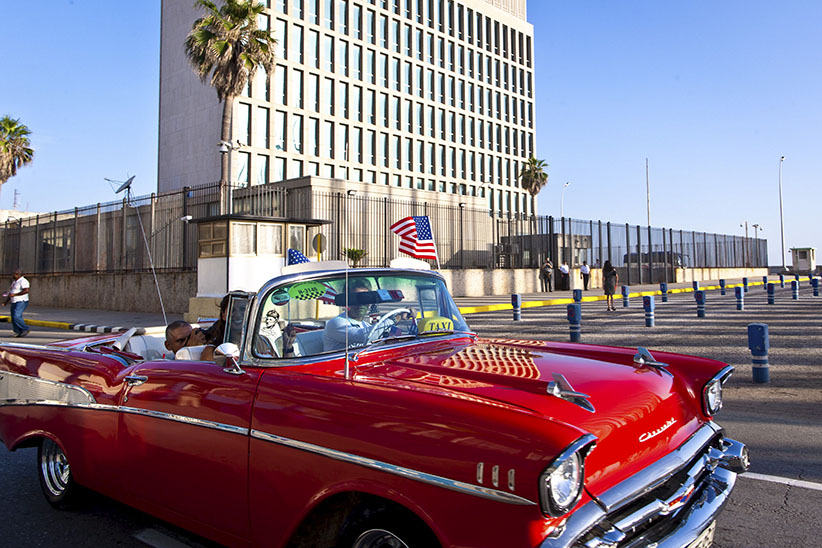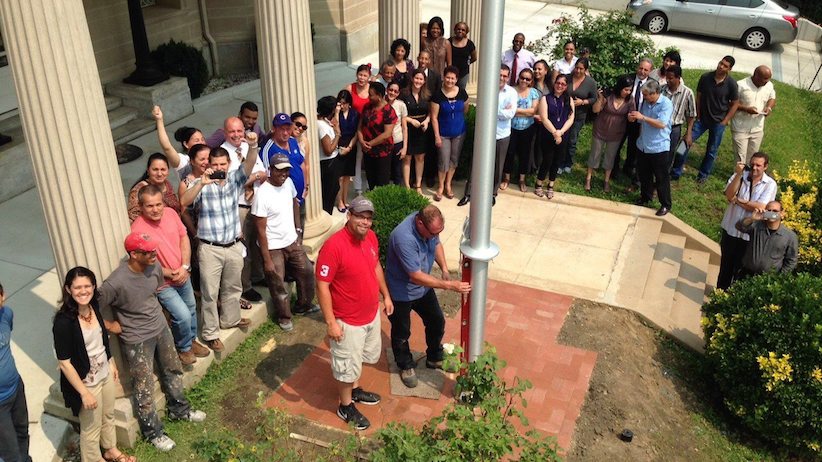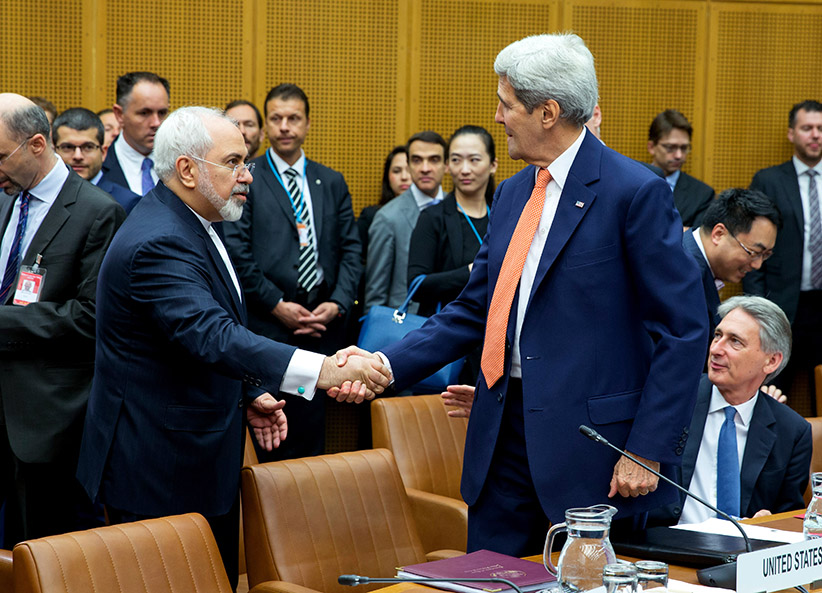The problem with Barack Obama’s foreign policy approach
Barack Obama has extended a hand to two old enemies in Iran and Cuba. Here’s why you shouldn’t expect them to unclench their fists.
(150720) — HAVANA, July 20, 2015 (Xinhua) — A tourist from California waves a U.S. national flag inside a vintage American car near the U.S. Embassy in Havana, Cuba, on July 20, 2015. Cuba and the United States reopened their respective embassies on Monday as part of their recent agreement to restored diplomatic relations. (Liu Bin/XINHUA-REA/Redux)
Share

It has taken until the twilight of his presidency, but now, finally, Barack Obama is crafting the sort of legacy in foreign policy that he no doubt hopes will define his terms in office.
Last week, the Cuban flag was raised at its Embassy in Washington for the first time in more than five decades, as Washington and Havana formally restored diplomatic relations. These ties were broken in 1961 following the Cuban Revolution and creation of a socialist state led by revolutionary Fidel Castro. Secretary of State John Kerry will travel to Havana in August for a ceremonial raising of the American flag at the U.S. Embassy there.
The thaw with Cuba ends America’s longest diplomatic standoff—after its ongoing state of frozen belligerency with North Korea. It came only days after a more dramatic and consequential breakthrough with another long-time enemy: Iran.
Following months of negotiations between Iran and the so-called P5+1 of world powers (America, Britain, France, China and Russia, plus Germany), a deal was struck to curb Iran’s nuclear program in exchange for an easing of sanctions against it. Though ostensibly a multilateral effort, at its heart, the bargaining was between Washington and Tehran.
Related: Michael Petrou on the real ramifications of the Iran deal
There are other developments and events that will shape Obama’s legacy on the world stage. Syria is a spreading stain that his reputation will not escape. His “reset” with Russia came to nothing. Moscow annexed the Ukrainian region of Crimea and covertly invaded eastern Ukraine—resulting in the worst relationship between Russia and the West since the Cold War.
But by reconciling with Cuba and Iran, Obama is moulding a legacy of his own choosing. In his inaugural address more than six years ago, Obama targeted “those who cling to power through corruption and deceit and the silencing of dissent,” and promised that “we will extend a hand, if you are willing to unclench your fist.” It was an implicit appeal to Iran and, to a lesser extent, Cuba. It was also an assertion of how Obama believed America should conduct its foreign affairs: by engagement rather than force, by persuasion rather than coercion.
The two deals will be consequential for the economies of Cuba and Iran. Although a trade embargo with Cuba remains in place, the lifting of travel restrictions with the United States will bring investment through tourism, and will also facilitate visits between Cubans and the large Cuban diaspora in America. And the embargo itself may not last. As University of Central Florida history professor Luis Martínez-Fernández points out, Havana needs to be rebuilt, and there are American companies ready to supply everything from fibre-optic cable to cement. He predicts this will result in political pressure in the United States to lift the embargo.
Iran is poised to reap a much bigger windfall. It will receive billions of dollars in oil revenue from lifted sanctions. Its isolation from most of the West, carefully built up through U.S.-led international pressure, is coming to an end.
By any measure, Obama has made good on his promise to extend a hand. But have Cuba and Iran unclenched their fists?
American hostility to Iran and Cuba is rooted in more than geostrategic inertia. Both countries repress dissent and violate the human rights of their citizens. Iran sponsors terror, through proxies has killed American troops in Iraq and, in Syria, backs the regime of Bashar al-Assad—which has compiled a death toll far larger than that of the jihadist group Islamic State. Will any of this change as a result of Obama’s engagement?

Wayne Smith was third secretary at the American embassy in Havana, when the Stars and Stripes was pulled down and embassy staff were driven in buses to a seaside dock, where they were loaded on a boat for home.
Smith, who had honeymooned in Cuba, hoped he and the rest of the American diplomatic team would soon return. “Most of us thought it would be relatively brief. Yes, we would break relations, but, within a few years at most, we would re-engage and begin to work on a new relationship. Well, that turned out not to be the case, and 54 years went by,” he says.
Smith, now a senior fellow at the Center for International Policy, describes the raising of the Cuban flag in Washington as “wonderful,” and hopes to be in Havana when the American one is raised there. “We have serious disagreements with the Cubans, of course, but I have always thought we had a greater chance of addressing those disagreements positively, through dialogue and engagement,” he says, adding that America tried coercion and isolation for 50 years and got nowhere.
María de los Angeles Torres, a professor of Latin American and Latino studies at the University of Illinois in Chicago, likens the sort of transition that may take place in Cuba to that which occurred in East Germany following the fall of the Berlin Wall. There are close ties between Cuba and Miami that will shape political discussion in Cuba. The country’s ruling elite doesn’t want this, she says, but they won’t be around forever.
Not all dictatorships transition to democracy as smoothly as did East Germany. And Martínez-Fernández doubts the authoritarianism that has been entrenched in Cuban society will easily melt away. He says Cuba once had a strong tradition of organized labour, for example. After the revolution, the new Cuban government co-opted and destroyed it. There is no free press, nor genuine political pluralism.
“There are all these calls for Cuba to become modernized in the economic sense, but, as far as democracy, I haven’t seen any positive changes. People still get beaten up, the Ladies in White [an opposition group] abused, and [there is] no access to the Internet.”
There is also a “culture of espionage” in Cuba, he says, that won’t change, even with an influx of American investment. In fact, he says, such a culture will be necessary to preserve Cuba’s authoritarian revolutionary political system when more capitalism is introduced. “People are sanguine. There’s a festive atmosphere. And no one is asking what this means for the average Cuban worker,” he says.
Obama, says Martínez-Fernández, should have pushed for progress on human rights and democratization during negotiations. Similar criticism has been made regarding the Iran nuclear deal. When presenting it, Obama was careful to limit its scope. Negotiations were about Iran’s nuclear program, he stressed, not the nature of its government or its actions abroad. But he added this: “And my hope is that, building on this deal, we can continue to have conversations with Iran that incentivize them to behave differently in the region, to be less aggressive, less hostile, more co-operative, to operate in the way we expect nations in the international community to behave. But we’re not counting on it.”
“There is an underlying flaw, I think, in the Obama approach,” says Robert J. Lieber, a professor of government and international affairs at Georgetown University. “It’s the assumption that outreach, engagement, the extended hand, will cause a transformation in behaviour. But the evidence for that proposition is very slim.”

Iran is hostile to America because “it is deeply embedded in the ideology of the regime, in their purposes, in their beliefs, rather than as a reaction to what we say and do over the years.” Repression, says Lieber, is at the core of both countries’ systems of government and, as such, should have been explicitly challenged during negotiations. “You negotiate to open up tourism and trade and establish diplomatic relations, and you can’t get them to release political prisoners? I doubt they even tried,” he says, referring to Cuba.
“In the case of the Iranians, you can’t get them to release Washington Post bureau chief [Jason Rezaian, jailed since July 2014], who’s held in Tehran in brutal conditions on trumped-up charges? It’s preposterous.”
Many Iranian dissidents were supportive of negotiations, according to a June report by the International Campaign for Human Rights in Iran. Interviewees cited the severe toll sanctions have taken on ordinary Iranians. Some expressed hope that a negotiated settlement would lead to progress on human rights and political freedoms. But there is little reason to believe Tehran sees negotiating a deal as a reason to moderate how it governs at home, or how it acts abroad. Amnesty International reports that Iran executed nearly 700 people between Jan. 1 and July 15 of this year, in the midst of the negotiating process.
“In the few instances where we’ve seen the regime compromise, they’ve clamped down internally to send a signal to the population that external flexibility doesn’t mean internal weakness,” Karim Sadjadpour, a senior associate at the Carnegie Endowment for International Peace, said in a recent media call.
How, then, should Obama’s strategy of engaging with foes be judged, now that it has yielded results? According to Lieber, the negative repercussions are substantial. Illiberal regimes have been bolstered. And America has sent a message that its commitment to democracy and human rights is soft.
A more generous answer is possible, if the deals are considered narrowly, ignoring their broader symbolism and possible knock-on effects. The nuclear deal with Iran, if successfully implemented, at least delays a possibly violent confrontation between the U.S. and Iran. Opening up to Cuba may result in economic opportunities for American businesses. Travel, including for separated families, will be eased. As foreign policy legacies for a two-term president go, it’s modest stuff.